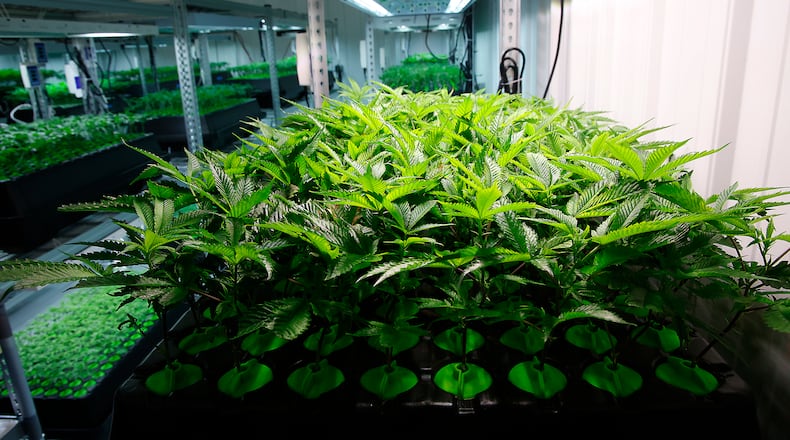Although recreational cannabis sales started more than a year ago in Ohio, the federal reclassification of marijuana would open pathways for dispensaries to access some banking services and tax benefits, as well as lift some barriers toward medical cannabis research.
But reclassifying marijuana would not make it nationally legal for recreational use by adults. It would instead change the way marijuana is regulated and taxed, said Larry Pegram, the owner of Pure Ohio Wellness.
Pure Ohio Wellness operates a cultivation and processing site in Springfield and a dispensary in Dayton.
Revisiting reclassification
President Donald Trump did not reveal this week his administration’s specific plans for reclassification.
The Biden administration last year asked both the Department of Health and Human Services and the attorney general, who oversees the Drug Enforcement Administration, to review how marijuana was classified, considering a shift to the Schedule III category.
Schedule III drugs include ketamine, anabolic steroids and some acetaminophen-codeine combinations and are controlled substances. They’re subject to rules that allow for some medical uses, and for federal criminal prosecution of anyone who traffics in the drugs without permission.
But no decision from that review was made before ex-President Joe Biden left office, although the public comment period for the review received thousands of responses.
The National Sheriffs’ Association was among organizations that submitted written opposition, highlighting prior determinations that marijuana has a “high abuse potential” and pointing to cases of “extreme intoxication” and fatal vehicle crashes.
Local law enforcement leaders during this federal review last year told this news outlet that the reclassification of marijuana likely wouldn’t have much of an impact on sheriff’s offices, but reported confusion about federal and state cannabis law in their communities.
Business and business
Rescheduling wouldn’t directly affect a common marijuana business problem: difficulty accessing banks, particularly for loans, because the federally regulated institutions are wary of the drug’s legal status.
But reclassification could open up some funding opportunities for cannabis businesses, and interest rates could drop, Pegram said.
Under the federal tax code, businesses involved in “trafficking” in marijuana or any other Schedule I or II drug can’t deduct rent, payroll or various other expenses that other businesses can write off. Some industry groups estimate that the tax rate ends up at 70% or more.
Pegram said this cost is often rolled over to products that are sold by dispensaries.
But the deduction rule doesn’t apply to Schedule III drugs, so the proposed change would cut cannabis companies’ taxes substantially.
“All these things that would happen wouldn’t change anything from the customer or patient’s point of view, per se, on how things are sold,” he said. “But it would lower the cost for cannabis companies to do business, which means the price will be lowered at the end of the day.”
Research
Trump told national outlets this week that he’s weighing the pros and cons of a marijuana policy change, noting it’s a “very complicated subject” but that he’s particularly interested in medical research.
“I’ve heard great things having to do with medical” use of marijuana and “bad things having to do with just about everything else,” Trump said.
Ohio is among 40 states that have legalized medical cannabis and among 24 states (and the District of Columbia) that have implemented a recreational cannabis program.
As of the end of June, nearly 458,000 patients were registered in Ohio’s medical cannabis program, according to the Ohio Division of Cannabis Control.
Because marijuana is on Schedule I, it’s been very difficult to conduct authorized clinical studies that involve administering the drug.
Schedule III drugs are easier to study, though the reclassification wouldn’t immediately reverse all barriers to study. It’s unclear whether researchers will be able to study marijuana from state-licensed dispensaries and how the federal Food and Drug Administration might oversee that.
“I think changing it to Schedule III is the first step and the right way of handling cannabis in the future,” Pegram said.
The Associated Press contributed to this report.
About the Author

